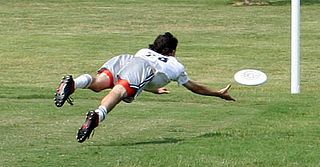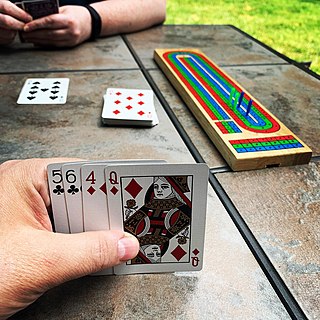In baseball, an earned run is any run that was fully enabled by the offensive team's production in the face of competent play from the defensive team. Conversely, an unearned run is a run that would not have been scored without the aid of an error or a passed ball committed by the defense.

Ultimate, originally known as ultimate Frisbee, is a non-contact team game played by players with a flying disc, flung by a human. Ultimate was developed in 1968 by a group of students at Columbia High School in Maplewood, New Jersey. Although ultimate resembles many traditional sports in its athletic requirements, it is unlike most sports due to its focus on self-officiating, even at the highest levels of competition. The term Frisbee, often used to generically describe all flying discs, is a registered trademark of the Wham-O toy company, and thus the sport is not formally called "ultimate Frisbee", though this name is still in common casual use. Points are scored by passing the disc to a teammate in the opposing end zone. Other basic rules are that players must not take steps while holding the disc, and interceptions, incomplete passes, and passes out of bounds are turnovers. Rain, wind, or occasionally other adversities can make for a testing match with rapid turnovers, heightening the pressure of play.

Euchre or eucre is a trick-taking card game commonly played in Australia, Canada, New Zealand, Great Britain, and the United States. It is played with a deck of 24, 28, or 32 standard playing cards. Normally there are four players, two on each team, although there are variations that range from two to nine players.

Cribbage, or crib, is a card game, traditionally for two players, that involves playing and grouping cards in combinations which gain points. It can be adapted for three or four players.

500 rum, also called pinochle rummy, Michigan rummy, Persian rummy, rummy 500 or 500 rummy, is a popular variant of rummy. The game of canasta and several other games are believed to have developed from this popular form of rummy. The distinctive feature of 500 rum is that each player scores the value of the sets or cards they meld. It may be played by 2 to 8 players, but it is best for 3 to 5.

Troy is a 2004 epic historical war film directed by Wolfgang Petersen and written by David Benioff. Produced by units in Malta, Mexico and Britain's Shepperton Studios, the film features an ensemble cast led by Brad Pitt, Eric Bana, and Orlando Bloom. It is loosely based on Homer's Iliad in its narration of the entire story of the decade-long Trojan War—condensed into little more than a couple of weeks, rather than just the quarrel between Achilles and Agamemnon in the ninth year. Achilles leads his Myrmidons along with the rest of the Greek army invading the historical city of Troy, defended by Hector's Trojan army. The end of the film is not taken from the Iliad, but rather from Quintus Smyrnaeus's Posthomerica as the Iliad concludes with Hector's death and funeral.
Soundtrack Pro is a discontinued music composing and audio editing application made by Apple Inc. featured in Logic Studio and Final Cut Studio that included a collection of just over 5,000 royalty free professional instrument loops and sound effects. It was discontinued with the release of Final Cut Pro X, Motion 5, and Compressor 4.

This is a general glossary of the terminology used in the sport of cricket. Where words in a sentence are also defined elsewhere in this article, they appear in italics. Certain aspects of cricket terminology are explained in more detail in cricket statistics and the naming of fielding positions is explained at fielding (cricket).

In cricket, batting is the act or skill of hitting the ball with a bat to score runs and prevent the loss of one's wicket. Any player who is currently batting is a batter,batsman or batswoman, regardless of whether batting is their particular area of expertise. Batting players have to adapt to various conditions when playing on different cricket pitches, especially in different countries - therefore, as well as having outstanding physical batting skills, top-level batters will have quick reflexes, excellent decision-making and be good strategists.
Stroke play, also known as medal play, is a scoring system in the sport of golf in which the total number of strokes is counted over one, or more rounds, of 18 holes; as opposed to match play, in which the player, or team, earns a point for each hole in which they have bested their opponents. In stroke play, the winner is the player who has taken the fewest strokes over the course of the round, or rounds.

Woodturning is the craft of using the wood lathe with hand-held tools to cut a shape that is symmetrical around the axis of rotation. Like the potter's wheel, the wood lathe is a simple mechanism that can generate a variety of forms. The operator is known as a turner, and the skills needed to use the tools were traditionally known as turnery. In pre-industrial England, these skills were sufficiently difficult to be known as 'the misterie' of the turners guild. The skills to use the tools by hand, without a fixed point of contact with the wood, distinguish woodturning and the wood lathe from the machinist's lathe, or metal-working lathe.
The following is a glossary of the terminology currently used in the sport of golf. Where words in a sentence are also defined elsewhere in this article, they appear in italics. Old names for clubs can be found at Obsolete golf clubs.
This is a glossary of terms in curling.
The following is a glossary of traditional English-language terms used in the three overarching cue sports disciplines: carom billiards referring to the various carom games played on a billiard table without pockets; pool, which denotes a host of games played on a table with six pockets; and snooker, played on a large pocket table, and which has a sport culture unto itself distinct from pool. There are also hybrid pocket/carom games such as English billiards.

Conquian, Coon Can or Colonel is a rummy-style card game. David Parlett describes it as an ancestor to all modern rummy games, and a kind of proto-gin rummy. Before the appearance of gin rummy, it was described as "an excellent game for two players, quite different from any other in its principles and requiring very close attention and a good memory to play it well".
304, pronounced three-nought-four, is a trick-taking card game popular in Sri Lanka, coastal Karnataka, Tamil Nadu and Maharashtra, in the Indian sub continent. The game is played by two teams of two using a subset of the 52 standard playing cards so that there are 32 cards in play.
In gridiron football, a turnover on downs occurs when a team's offense has used all their downs but has not progressed downfield enough to earn another set of downs. The resulting turnover gives possession of the ball to the team currently on defense.
Variations is a series of works by the American composer John Cage. A number of the pieces in the series are seminal examples of indeterminate music, others are happenings: performance pieces executed according to the score.

World Series of Fighting (Canada) formerly Aggression Fighting Championship, Aggression MMA and Armageddon Fighting Championship is a Canadian Mixed Martial Arts promotion based out of Edmonton, Alberta, Canada. The promotions made their debuts in 2009. Armageddon Fighting Championship and Aggression MMA merged in 2012 to create Aggression Fighting Championship. In September 2013, World Series of Fighting purchased the Aggression Fighting Championship organization to enter the Canadian market, but it was later found out the AFC executives closed down the company to join a new organization WSOF Canada.
Rumble on the Rock was an American mixed martial arts (MMA) promotion company in promotion with K-1 and operated by Fighting and Entertainment Group and Rumble World Entertainment. Headquartered Hawaii, Rumble on the Rock was formed in 2002 and enforces the Unified Rules of Mixed Martial Arts with events structured around tournaments.










